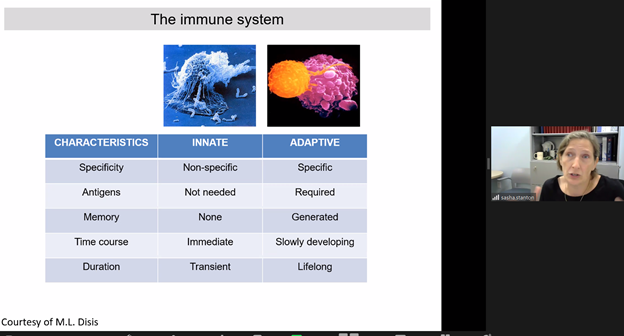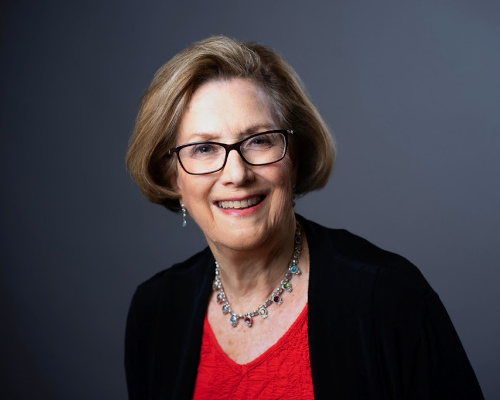Project LEAD Refresher – Thanks To All!

On July 12 – July 16, NBCC hosted the first-ever Virtual Project LEAD Refresher! More than 100 Project LEAD graduates participated in this 20+ hour training. For some advocates, many years have passed since they attended, and the science has evolved in important ways. Participants heard lectures on basic cancer science, genetics, screening, study design, immunology, and more from Project LEAD’s distinguished faculty members. With the help of skilled advocate facilitators and fellows and faculty from the Salk Institute, attendees also spent time in daily study groups to help synthesize and solidify what they were learning.
The response to the program was overwhelmingly positive. Advocates said the course provided them with “a sense of confidence in collaborating with researchers in advocating for breast cancer patients,” and that it “boosted [their] knowledge… and generally gave [them] some new things to think about in [their] advocacy work.” Many participants reflected that Project LEAD had changed their advocacy for the better and that this course provided them with a renewed enthusiasm.
Given this success, we hope to be able to provide similar programming in the future. And we look forward to hosting two back-to-back 2022 Project LEAD Institutes in La Jolla to train a new cadre of advocates.
Thank you to all who spent the week with us and to our faculty members and fellows for dedicating their time and expertise to Project LEAD!
NBCC Position on Screening Mammography—Updated July 2021
NBCC has posted its updated position statement on mammography screening in a healthy population. Screening is a complex issue and the statement should be read in conjunction with viewing background videos as follows:
Update on Breast Cancer Incidence and Mortality
A July 2021 “Report to the Nation”[i] gave updated cancer statistics for the period 2001 through 2018. The bottom line, the news isn’t so great for breast cancer. Annual declines (i.e., progress) in deaths from breast cancer continue to slow.
Incidence
While overall cancer incidence rates have remained stable for the last five years (2013-2017) for females, breast cancer incidence has actually increased (0.5% per year between 2014-2017) in every racial/ethnic group. The largest increases were observed among non-Hispanic Asian/Pacific Islanders (API) (1.7% increase annually).
Mortality
Among females, deaths from breast cancer continue to be the second leading cause of death from cancer, next to lung cancer, except among Hispanic females, in whom breast cancer was the most common cause of cancer-related death.
Death rates from breast cancer among females decreased modestly (1% per year) during 2014-2018 in every racial/ethnic group, except among API and American Indian/Alaska Native females, where death rates were stable. Sadly, this continues an undesirable trend of annual declines in breast cancer deaths getting smaller and smaller, despite the numerous “game-changing” new drugs that have entered the market over the last decade. Female breast cancer death rates decreased 2.3% per year on average during 2003-2007, 1.6% during 2007-2014, and 1.0% during 2014-2018.
Breast Cancer Among Adolescents and Young Adult Females
Another concerning trend pertains to breast cancer incidence and death rates among adolescents and young adults (15-39 years). Female breast cancer is the most common cause of cancer and cancer-related death in this age group. The incidence of breast cancer in this age group was stable from 2001 through 2010 but has increased 1.1% per year between 2010 and 2017, probably due to screening.
Death rates from female breast cancer among Black female adolescents and young adults (4.0 per 100,000) were twice as high as among white females (2.0) and Hispanic females (1.8) in this age group. And while breast cancer death rates among adolescents and young adults declined by 3.2% per year from 2001-2010, those declines have stopped between 2010-2018.
What do these numbers tell us? We are not making progress. These trends require bold action by trained breast cancer advocates. We need primary prevention approaches, a push for evidence-based interventions, and treatments that do more than just extend progression-free survival (an outcome with no clinical benefit) by a couple of months if we want to accelerate improvements and save lives.
Advocate Spotlight: Dale Eastman

Dale Eastman was diagnosed in October 1990 with stage 3 breast cancer at age 49. Twenty-eight years later, in October 2018, she was diagnosed with a metastatic recurrence. Her initial diagnosis drove her to become an advocate for women with breast cancer.
Dale is a proud 1995 graduate of NBCC’s Project LEAD science training course and a participant in numerous Advocacy Training Conferences and Advocate Leadership Summits. She has embraced her leadership in every way possible, leading the advocacy charge on both a state and national level. Her leadership resulted in Texas enacting laws ranging from expanding access to care for underserved women with breast and cervical cancer to mandating coverage of routine health care costs associated with clinical trials and mandating advocate involvement in research programs, among many others. Read more about her incredible journey here.
Double Your Impact when you Donate by August 31
NBCC’s programs are different from the usual. When we demand more funding from government for science, we also demand and get a seat at the table to help oversee how those funds are spent. We set a public policy agenda that matters and then get it enacted into law. We collaborate with scientists on research that matters. And we can do all that in a meaningful way because of our programs that educate and train women and men who want to end breast cancer.
We do not charge for these programs, so we need donor support to keep them going. Please make your gift today at www.stopbreastcancer.org/donatenow. Thanks to the generous support of the Vance Wall Foundation, all donations received by mail or online by August 31 will be matched up to $50,000. If you have already given this year, please consider another gift and have your donation doubled.
[i] Islami F, Ward EM, Sung H, Cronin KA, Tangka FKL, Sherman RL, Zhao J, Anderson RN, Henley SJ, Yabroff KR, Jemal A, Benard VB. Annual Report to the Nation on the Status of Cancer, Part 1: National Cancer Statistics. J Natl Cancer Inst. 2021 Jul 8:djab131. doi: 10.1093/jnci/djab131. Epub ahead of print. PMID: 34240195.